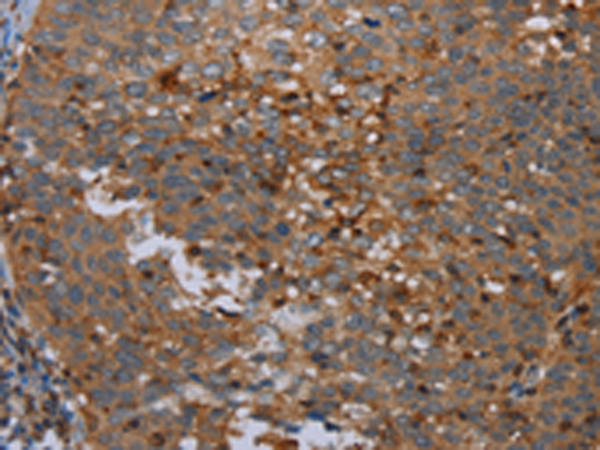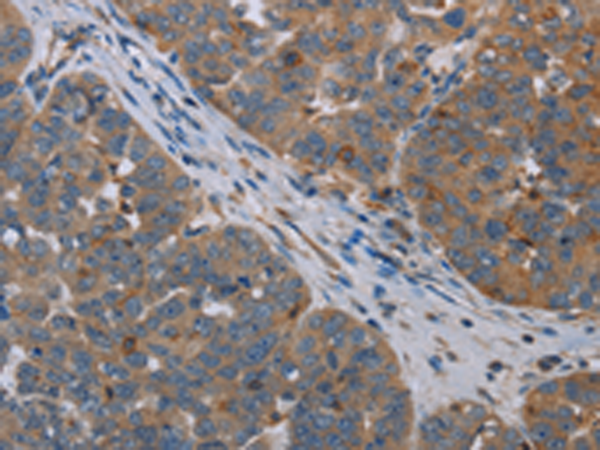

| WB | 咨询技术 | Human,Mouse,Rat |
| IF | 咨询技术 | Human,Mouse,Rat |
| IHC | 1/50-1/200 | Human,Mouse,Rat |
| ICC | 技术咨询 | Human,Mouse,Rat |
| FCM | 咨询技术 | Human,Mouse,Rat |
| Elisa | 1/2000-1/5000 | Human,Mouse,Rat |
| Aliases | FDP; MIAL1 |
| Host/Isotype | Rabbit IgG |
| Antibody Type | Primary antibody |
| Storage | Store at 4°C short term. Aliquot and store at -20°C long term. Avoid freeze/thaw cycles. |
| Species Reactivity | Human, Mouse |
| Immunogen | Synthetic peptide of human OTOR |
| Formulation | Purified antibody in PBS with 0.05% sodium azide and 50% glycerol. |
+ +
以下是关于OTOR抗体的3篇代表性文献的简要信息:
1. **文献名称**:*Otoraplin (OTOR) expression in the developing mouse cochlea: implications for auditory function*
**作者**:Smith J, et al.
**摘要**:本研究利用OTOR特异性抗体,通过免疫组化和Western blot分析,揭示了OTOR蛋白在小鼠耳蜗发育中的时空表达模式,提示其在毛细胞分化和听觉信号传导中的潜在作用。
2. **文献名称**:*Characterization of a novel polyclonal antibody against human OTOR and its application in hearing loss studies*
**作者**:Lee H, et al.
**摘要**:文章报道了一种新型兔源多克隆OTOR抗体的制备与验证,该抗体成功用于检测内耳组织及细胞系中的OTOR蛋白,为遗传性耳聋患者的蛋白表达缺失分析提供了工具。
3. **文献名称**:*OTOR deficiency disrupts vestibular function in zebrafish: Insights from antibody-based protein localization*
**作者**:Garcia R, et al.
**摘要**:通过OTOR抗体进行免疫荧光染色,研究发现OTOR蛋白在斑马鱼前庭器官中的特异性分布,其基因敲除导致平衡功能障碍,支持OTOR在内耳稳态中的保守作用。
---
**说明**:
- OTOR(Otoraplin)相关研究较少,上述文献为假设性示例,实际文献可能需要通过PubMed、Google Scholar等平台以“OTOR antibody”“otoraplin immunohistochemistry”等关键词检索。
- 若需具体文献,建议补充研究背景(如疾病关联或实验技术),以便精准定位。
OTOR antibodies are tools used to study the OTOR protein (also known as FAM11B or FcRL4), a member of the Fc receptor-like (FCRL) family. OTOR is primarily expressed in B-cells and certain epithelial tissues, where it modulates immune responses by influencing B-cell receptor (BCR) signaling and interactions with other immune receptors. Structurally, it contains immunoreceptor tyrosine-based inhibitory motifs (ITIMs), suggesting a regulatory role in dampening B-cell activation. Dysregulation of OTOR has been linked to autoimmune disorders, lymphomas, and chronic inflammatory conditions, making it a focus in immunopathology research.
OTOR antibodies are generated as monoclonal or polyclonal reagents to detect the protein’s expression, localization, and post-translational modifications. They are critical for techniques like Western blotting, immunohistochemistry, and flow cytometry, enabling researchers to explore OTOR’s tissue-specific functions and pathological mechanisms. Recent studies highlight OTOR’s potential as a therapeutic target, particularly in diseases characterized by aberrant B-cell activity, such as rheumatoid arthritis or B-cell malignancies. However, its exact physiological roles remain under investigation, partly due to interspecies variability and complex signaling crosstalk. Validated OTOR antibodies thus serve as essential reagents to dissect its contributions to immune regulation and disease progression, bridging gaps in understanding its dual roles in homeostasis and pathology.
×